Are Natural Deodorants Better Than Antiperspirant? Top MDs Say: 'Yes!'
You've been using the same antiperspirant for years. It has always done its job at keeping sweat at bay. Plus, you've rolled it under your arms for so long, the scent has just become part of who you are. But lately you've noticed more and more "natural" deodorants on your drugstore's shelves, and you've heard talk of the chemicals in antiperspirants causing health problems, and you're now asking yourself, "are natural deodorants better?"
You’re not alone: There's been a slew of viral TikToks made by beauty influencers sharing how they are switching from their former chemical-laden antiperspirant to a natural deodorant. Their reasons for swapping range from avoiding skin irritation to worries over their current antiperspirant altering hormonal balances and possibly leading to cancer. Either way, no need for you to sweat it, because we got the low down from doctors who know.
Why sweat ends up smelling bad
The sweat released by our apocrine glands (these are found in areas with lots of hair follicles like armpits) is actually odorless. The pungent odor that comes from our underarms actually occurs after the bacteria already present on skin mixes with the odorless sweat. This little fact is key to evaluating whether natural deodorants are better and how they differ from antiperspirants.
What is an antiperspirant?
The way antiperspirants work is they stop odor by clogging pores using ingredients like aluminum chlorohydrate or aluminum zirconium. These compounds prevent any sweat from forming in the areas where antiperspirants are applied, says Andrea Hui Austin, M.D., a dermatologist at Bay Area Cosmetic Dermatology in San Francisco. No sweat, no odor bacteria to mix with, hence no odors.
“Over the years, there have been concerns with potential health risks from using aluminum compounds since they may be absorbed through the skin and could potentially disrupt hormonal function or have neurotoxic effects,” says Dr. Austin. And since sweating is one of the main ways our body moves toxins out, blocking sweat glands means those harmful toxins don’t get flushed out as quickly.
Another concern? Chemicals like phthalates (usually used for fragrance) and parabens (a preservative) that are commonly found in antiperspirants can enter the bloodstream once applied to skin. And once in the bloodstream, these chemicals may mimic hormones in your body, leading to hormonal flux that interferes with the endocrine system. “This is evident from how common skincare toxins like phthalates and parabens show up on bloodwork,” explains Dr. Austin.
It's also been reported that the "plugs" created by aluminum may interfere with estrogen receptors in the breast, potentially promoting the growth of breast cancer cells. That said, "there are no strong studies that link breast cancer risk with antiperspirants that contain aluminum," says Cindy Geyer, M.D., a board-certified internal medicine doctor based in Lenox, Massachusetts. So this is a cause for concern but no need to panic.
What are natural deodorants?

Natural deodorants are made with bacteria-neutralizing ingredients that work to banish odor, and they are free of aluminum-phthalate and parabens. This means they never block the release of sweat. Instead, they are infused with organic ingredients and natural preservatives and fragrances such as coconut oil and rose oil, that help keep pores clear in order to allow your body to get rid of harmful toxins through perspiration, while placing a fresh scent on skin to mask or absorbing body odor.
So we posed the question directly to Dr. Austin: Are natural deodorants better for you? In short: "Natural deodorants are considered a safer alternative," she says. That's because they “avoid harmful chemicals and instead focus on gentle, naturally-occurring ingredients."
“And although these ingredients do not block sweat, they can still prevent odor by absorbing moisture, neutralizing odor-causing bacteria, and can give additional benefits like soothing the skin, providing a relaxing scent and more,” says Dr. Austin.
Which natural deodorant is best for you?
While many strides have been made in the natural deodorant category, there are those find that they still smell that distinct underarm odor when wearing it.
When it comes to finding a natural deodorant that works best for you, looking for an option that works with the natural chemistry of your body is important as individual responses to deodorants may vary, Dr. Austin notes. “Keep in mind that finding the most effective and suitable natural deodorant for your body chemistry might require some trial and error.”
Also great? These days, many deodorants offer multiple benefits, so you might want to focus on the needs you might have for beyond keeping odor at bay. For example, you might want one that also helps tamp down on hot flashes, slow hair growth or lightens darker underarm skin.
To brighten dark underarms: Look for one made with alpha hydroxy acid
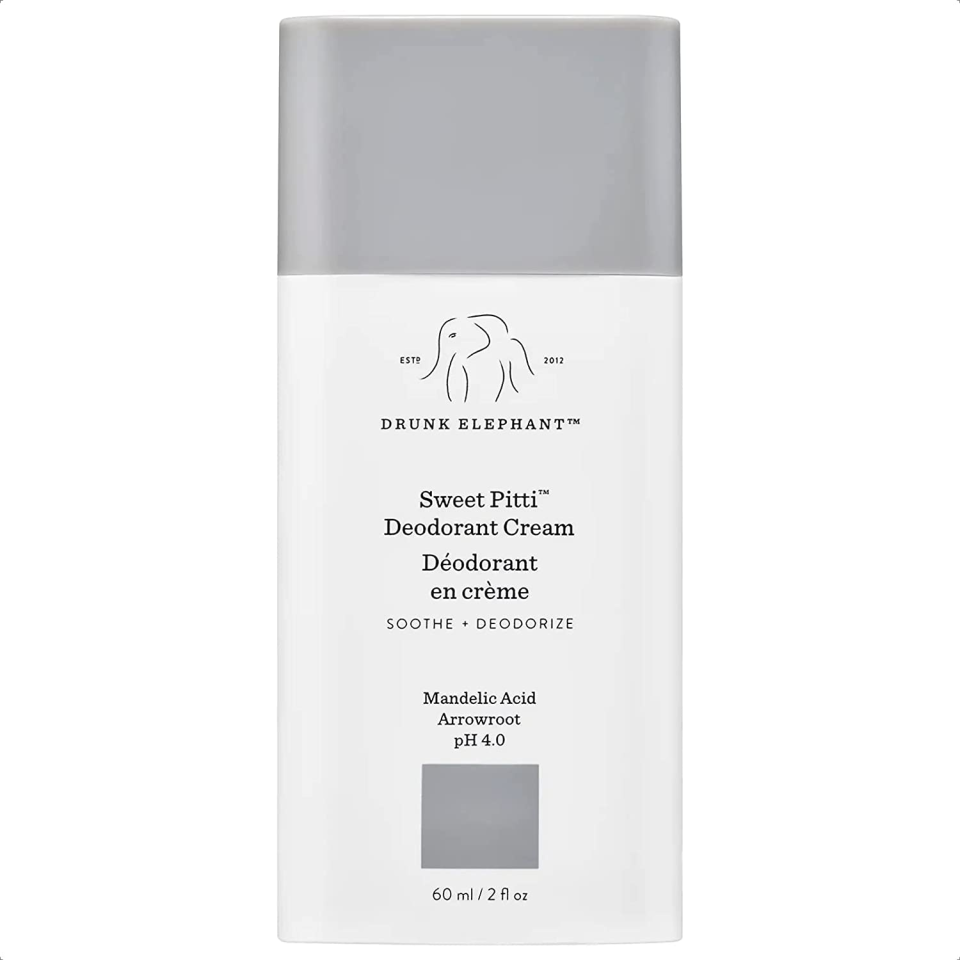
Drunk Elephant Sweet Pitti Deodorant Cream (Buy on Amazon, $16) is made with mandelic acid, an alpha hydroxy acid that gently exfoliates to remove a buildup of dead, dry skin cells that cause armpits to appear darker.
To soothe razor burn: Look for one made with milk and roses
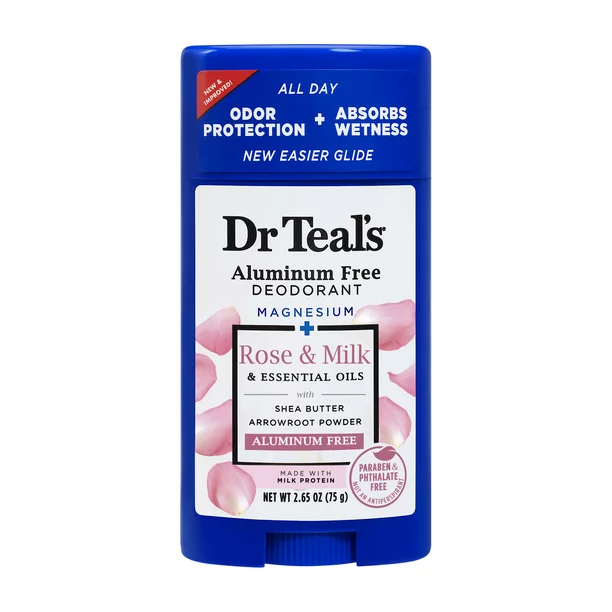
Dr Teal’s Aluminium Free Deoforant Rose & Milk (Buy from Walmart, $4.72) contains milk which has proteins that calm red, irritated skin, and the high amount of antioxidants in roses repairs skin and cuts down on inflammation.
To ease hot flashes: Look for one made with wild lavender
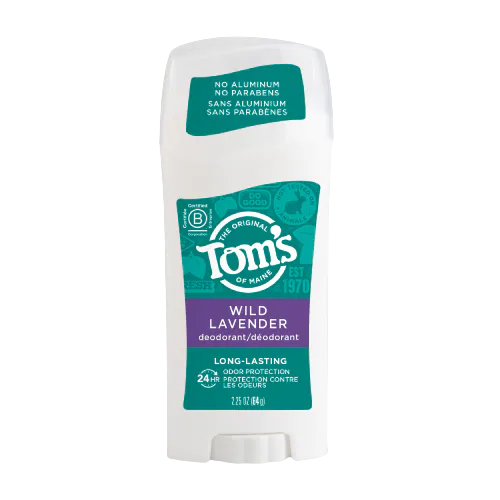
Tom’s of Maine Long Lasting Deodorant in Wild Lavender (Buy from Target, $4.89) is infused with the light floral scent which when inhaled helps soothe the central nervous system, which studies show can help ease hot flashes by 50%.
To treat + prevent underarm chafing: Look for one made with aloe vera juice
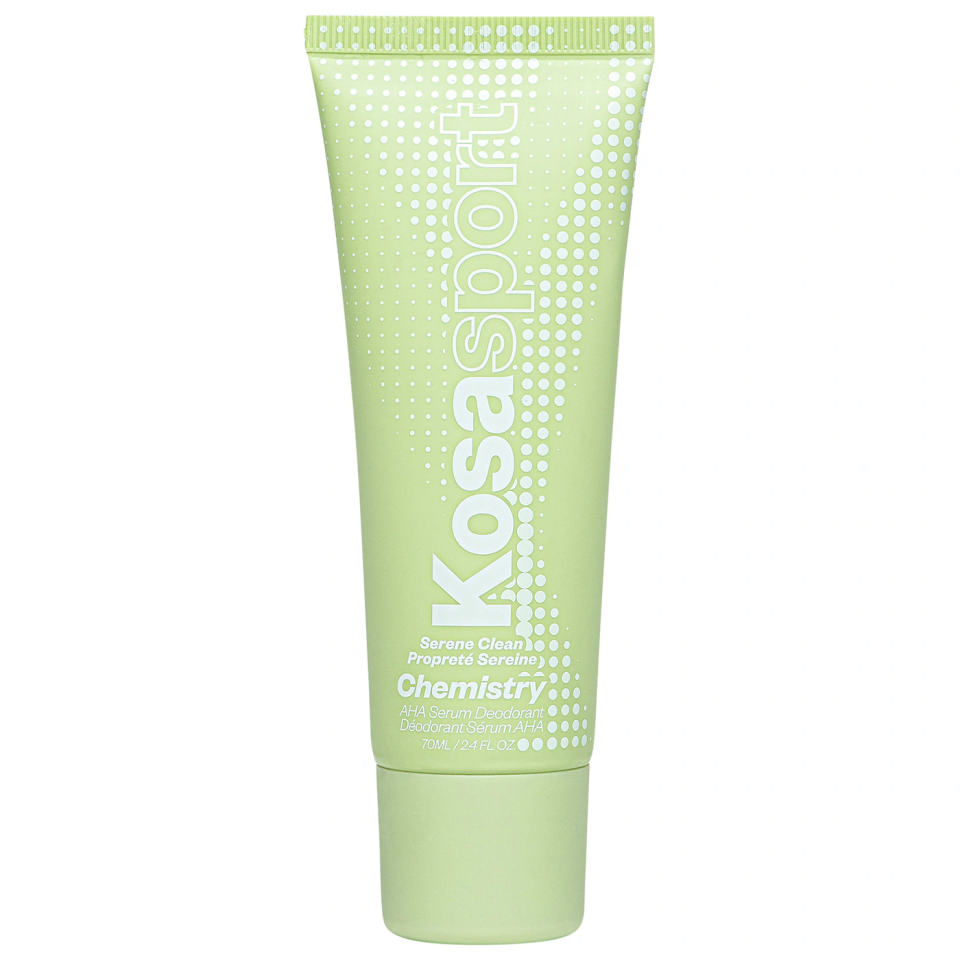
Kosas Chemistry AHA Serum Deodorant (Buy from Sephora, $16) is packed with skin-soothing ingredients like aloe vera juice and hyaluronic acid. Aloe's saponins create an invisible barrier over skin that limits friction, while humectant hyaluronic acid nourishes skin to heal already chafed underarms.
To reduce hair growth: Look for one made with plant extract
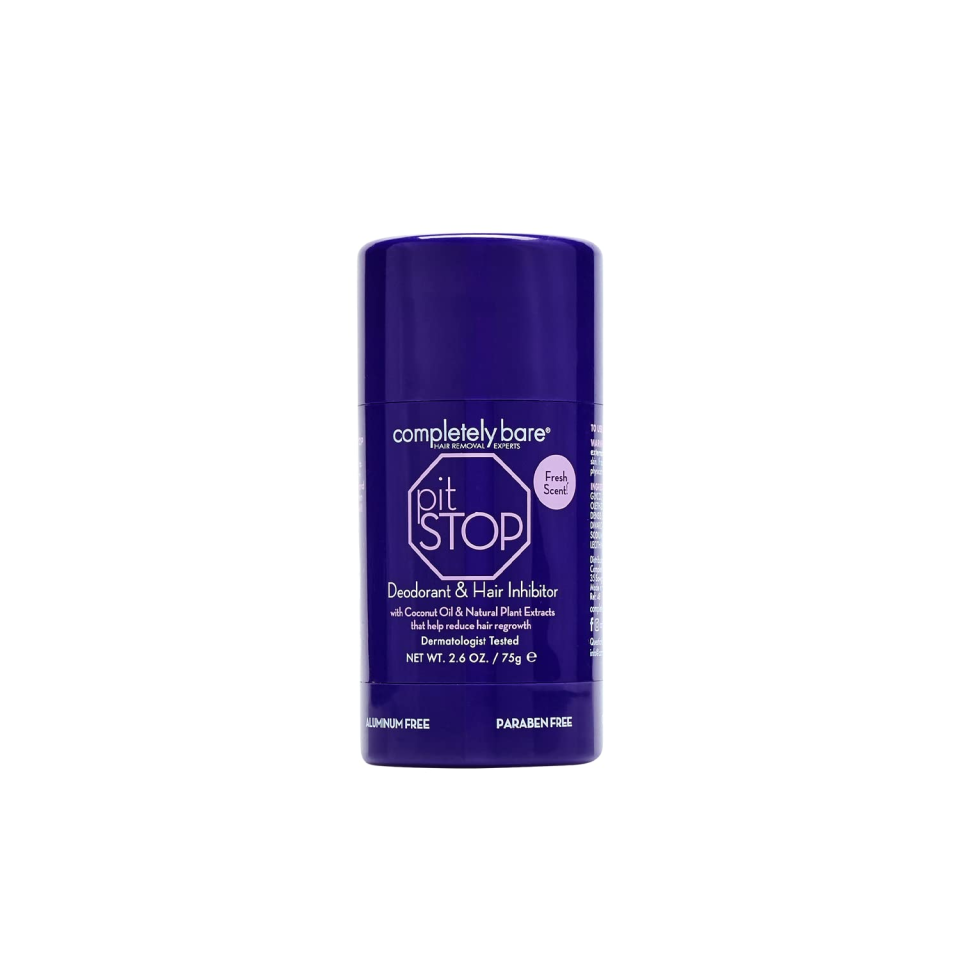
Completely Bare Pit Stop Deodorant (Buy on Amazon, $9.99) is made with capislow. This plant extract has anti-inflammatory properties and has been shown to inhibit hair growth. Even better? Its coconut oil base keeps underarm skin adequately moisturized.
DIY your own natural deodorant that's better for you
If you prefer to whip up your own natural deodorant, simply follow the below recipe from Heather Moday, M.D., a board-certified doctor in Norfolk, Virginia, who specializes in allergy and immunology, as well as integrative and holistic medicine.
To do: Mix 1?4 cup of baking soda, 1?4 cup of cornstarch, 1?3 cup of coconut oil and 6 to 10 drops of peppermint essential oil in a jar with a lid. Apply by warming up a dime-sized amount of the mixture in your hands until it’s liquid and rub under your arms.
Why it works: Baking soda absorbs odor, cornstarch soaks up excess sweat, peppermint oil is antibacterial and offers a pleasant scent and the coconut oil is antimicrobial.
How to make the switch to natural deodorants
One last thing to keep in mind when swapping to a natural deodorant, is that it’s perfectly natural to experience more moisture in the underarm area during the transition. In fact, Dr. Austin notes that an increased amount of sweating is a good sign, and perfectly normal when you swap, because your pores will no longer be blocked up.
Additionally, according to online beauty influencers like Lindsey Schmidt (as seen in the video below) doing a twice a week armpit "detox" before switching over to a natural deodorant will also help ease the transition. This pulls out impurities so the body can more easily adjust and allows natural deodorant to work its odor- and sweat-nixing magic.
To do: Skip using any type of anti perspirant or deodorant for one week (the colder months are a great time to try this out!). Then twice a week apply an armpit mask of 1 tablespoon each of bentonite clay (Buy on Amazon, $9.99), apple cider vinegar and warm water mixed together to form a yogurt-like consistency. Then swipe under the armpits and let sit for 10 minutes; wash off with warm water. Or try a premade clay mask (Buy from Curie, $16).
Why it works: Bentonite clay absorbs and removes embedded toxins and impurities while apple cider vinegar balances skin's pH level, creating a clean slate for natural deodorants.
Want to learn more about natural beauty alternatives? Check out these stories:
5 Ways to Transition to An All-Natural Beauty Routine
29 Best Natural Skincare and Beauty Products for Healthy, Glowing Skin
5 Natural Beauty Products For Your Biggest Problem Areas
First For Women aims to feature only the best products and services. We update when possible, but deals expire and prices can change. If you buy something via one of our links, we may earn a commission.
Questions? Reach us at [email protected]